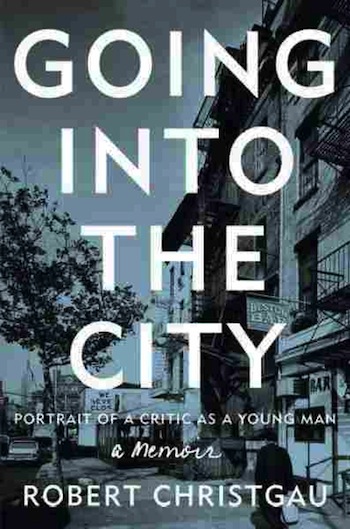Book Review: “Going into the City” — A Restrained Portrait of the Critic as a Young Man
Robert Christgau, the author of 14,000 record reviews, mostly in his decades as music editor of Village Voice, makes the case for expansiveness as the best aesthetic.
Going Into the City: Portrait of a Critic as a Young Man by Robert Christgau. William Morrow/Dey Street Books, 384 pages, 27.99.
By Gerald Peary

I can put away my embarrassment that, in the 1950s, I initiated my 45 rpm record collection with Perry Como’s two-sided hit, “Hot Diggity” and “Jukebox Baby,” and my first 33 rpm LP was Doris Day’s Greatest Hits. Robert Christgau, the Dean of American Rock Critics, has no problem with such straight, square, white-boy taste, as long I’d combined it (I did) with some love for Little Richard, Fats Domino, and Laverne Baker. As long as I made room for the 1950s finest instrumental, Bill Doggett’s “Honky Tonk” featuring “Clifford Scott’s tenor sax spilling and shouting and spluttering and rejoicing…”
In his autobiography, Going Into the City, the author of 14,000 record reviews, mostly in his decades as music editor of Village Voice, makes the case for expansiveness as the best aesthetic. Though an urbane East Villager who spent the mid-1970s squeezed into CBGBs, Christgau has an appreciation far beyond moody, ironic critics’ bands. He’s for popular music and joyful audiences. His two favorite musicians of the 20th century are Louis Armstrong and James Brown, ultra-showmen playing to the crowds. As for his first 45s, Christgau bought “Sh-Boom” by the Crew Cuts, honky Torontonians, and “Secret Love” by my sweet-voiced favorite, Doris Day.” Even now, Christgau makes no apologies. He still digs “Sh-Boom”; and “Secret Love,” he said, “…fed an appetite for melody I’d never lost.”
More mass taste: “The greatest disco singles are as enduring as the greatest punk albums.”
Christgau’s catholicity does stop at folk music, all that earnestness. But one year he did–begrudgingly?–place a McGarrigle Sisters LP in his five best along with the Sex Pistols. And he’s a hater of show tunes, even after rapturous hours of his childhood with South Pacific spinning on his turntable. Yet he’s all right with rap, hip hop, country, punk, jazz, Afro-pop, reggae, and, though it took a while, he’s a lover of funk. He can even get behind certain cover versions, those which actually improve on the originals, though his tolerance ends with Pat Boone, “the most notorious of the white cover artists…a poacher.”
It’s fun to compare one’s music taste with such a true know-it-all as Christgau. But for much of Going Into the City, I, a film critic with a fair knowledge of popular music, am lost in the dust. This is not, dear general reader, a book for you. The author, who probably doesn’t suffer fools, also doesn’t have the desire to explain anything to them. His memoir is packed and jammed with music groups and song titles thrown about, tossed together, and perhaps you get the references. It’s endless name-dropping, not to show off, but that’s just the way Christgau thinks and associates. It’s OK for a Voice column, much weariness for a 363-page book. How unusual when he gives a few paragraphs to Television’s Marquee Moon, a record he adores. He makes a case for me wanting to own it!
If he speed-dates through the music, Christgau stops for pages on end for ruminations on literature. Is that why I am choosing this book, for a rock critic’s thoughts on “Rime of the Ancient Mariner” versus “Casey at the Bat”? Or on the poems, William Carlos Williams’s “The Dance” and William Butler Yeats’s “Vacillation,” no matter how learned the author’s interpretations? Or in his validating my own affection for Christina Stead’s novel, The Man Who Loved Children?
No. I’ve picked up Going Into the City for fanboy reasons. I want Christgau to fill me in on the legendary rock critics of his seminal generation: R. Meltzer, Lester Bangs, Greil Marcus, Jon Landau, etc. I want to know all about his co-writers and editors in those legendary years at the Village Voice. Finally, I want Christgau to offer up some great stories of the musicians he wrote about.
On all three counts, Going Into the City fails badly. That’s because of Christgau’s willful decision not to supply the salient anecdotes. It may be in part because the author, not the most empathetic of writers, is really bad at character sketches. Whatever, I don’t know much about Bangs from Christgau’s descriptions, or even of Marcus, his lifetime friend. And you are not going to learn here about Jack Newfield, Nat Hentoff, Alexander Cockburn, Andrew Sarris, Molly Haskell. “I reported for duty to get my work done, not to gossip about it,” he rationalizes his unfortunate restraint discussing the Voice.

Critic Robert Christgau — “I reported for duty to get my work done, not to gossip about it.” Photo: Nina Christgau.
But he’s really frustrating when it comes to the famous. “…an uncharacteristically gracious Miles Davis tried to explain modality to me.” That’s the whole story. I had hope when John Lennon and Yoko Ono climbed the stairs to Christgau’s East Village flat. But he gets through his meetings with them as speedily as possible, and announces, “And that’s about it for dancing with the stars.”
Well, how about some counterculture “good old days”? Look to another book. “Sixties nostalgia has been turning my stomach since approximately 1974,” Christgau declares. “I can’t stand how grossly misremembered those years are….”
And what of plain autobiography? In his introduction, Christgau admits to have led a rather happy, normal existence. Mostly, he has. Without a sentimental sentence, he tells of his Queens childhood, son of a hot-tempered fireman, and how he became an obsessive reader, from the Bobbsey Twins to baseball novels, and how he did pretty well in high school, listened to oddball Jean Shepherd on the radio, and how he went to Dartmouth and “got good grades, kept my nose clean.” Nothing that interesting, including his failures with early girlfriends. It’s all brisk and fairly impersonal.
The times in the book when Christgau seems most invested are when discussing the two enormous loves of his life, rock writer and militant feminist, Ellen Willis (“Ellen was the smartest person I’ve ever known”), who was his girlfriend, and journalist and novelist, Carola Dibbell, whom he married and loves dearly. The most emotional scene by far in Christgau’s hardboiled book is when Carola confesses she’d been cheating on him. Yes, he was deeply shaken. Yes, Robert Christgau seems to have a heart.
Gerald Peary is a professor at Suffolk University, Boston, curator of the Boston University Cinematheque, and the general editor of the “Conversations with Filmmakers” series from the University Press of Mississippi. A critic for the late Boston Phoenix, he is the author of 9 books on cinema, writer-director of the documentary For the Love of Movies: the Story of American Film Criticism, and a featured actor in the 2013 independent narrative Computer Chess
Tagged: American rock criticism, American Rock Critics, Going into the City, Robert Christgau

Hi Gerry,
Been wanting to read this book, now I really want to read it. Does this finally snuff out your torch for the ‘critics-are-interesting-people’ idea you’re been carrying–hey, you even made a good movie about it! You can borrow my copy of Jim DeRogatis’s Let It Blurt: The Lester Bangs Story, which makes a pretty good case that the greatest gonzo rock-crit was a dysfunctional dork.
Cheers,
Tim Barry